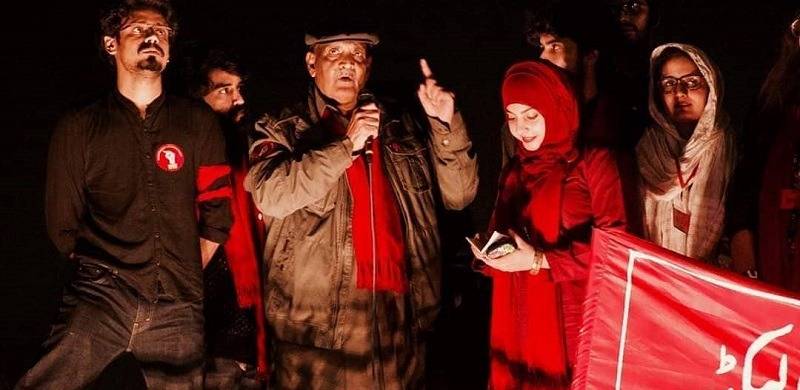
Progressives and leftists in Pakistan and all over the world are mourning the passing of socialist leader Dr. Lal Khan. He has been described as a source of inspiration and leadership for an entire generation of progressive activists in the country.
The influence of his work and ideas extended well beyond Pakistani borders, since he was a well-known figure from the Trotskyist current of the global Left.
His given name was Tanvir Gondal – Lal Khan being the name he adopted for himself. Born the son of a land owner who served in the military, Lal Khan came from Bhaun in district Chakwal.
Alan Woods of the International Marxist Tendency (IMT), who knew him well, says about the region where Lal Khan came from:
Unlike the lush green pastures of the central Punjab, this is a harsh and unyielding land, broken by mountains, rocks and stones. Tanvir used to say to me: “This land does not produce wheat, fruit or vegetables. It produces soldiers.” The people here are tough and resilient. They are also cheerful and enjoy music, dancing and jokes. But in time of war, as he explained to me, the villages are full of wailing women, mourning the death of their menfolk.
His father was an officer in the Pakistan army who naturally assumed that his son would follow in his footsteps. But Tanvir was always stubbornly independent, and he had other ideas. He wanted to study medicine, to become a doctor. And the intolerable injustices of society led him to seek the road to socialist revolution.
One of the hardest things he had to bear was not being able to be with his father when he died, being unable to travel to Pakistan under the dictatorship. But he remembered his father with great fondness.
He told me that in one of the last conversations they had, when his father learned of his revolutionary vocation, he said to him: “Son, no matter what you do, fight for what you believe. Remember you are a soldier. Never turn your back on the enemy. If you are going to be killed, make sure that you are shot from the front.” He took this advice to heart.
In the 1970s, Lal Khan was deeply involved in left-wing student activism. He went from clashes with right-wing Islamist student groups to being a dissident in the post-1977 era, once General Zia-ul-Haq established his regime.
Forced to flee the dictatorial regime, Lal Khan went into exile in the Netherlands. Building links with the global left, he came back leader of the Struggle group. Lal Khan was particularly close to influential British Marxist intellectual and activist Ted Grant. Even in exile abroad, Lal Khan remained involved in the efforts to resist dictatorial rule in Pakistan.
The end of the Zia regime allowed him to return to living and organizing in Pakistan.
He was, as mentioned earlier, just as influential in the IMT and other global left-wing organizations as he was in Pakistani left circles. His final break with the IMT came in 2016, due to the differences that he developed with its leadership.
In Pakistan, he was one of the main figures behind the Pakistan Trade Union Defence Campaign (PTUDC). A whole generation of younger progressive and left-wing activists came into their political selves either directly under his leadership or more broadly under his influence.
Lal Khan is from a generation of Marxists who lived through the 1968 moment and saw the worldwide militant leftist upsurge of the 1970s, the roll-back during the 1980s, the collapse in the 1990s and the revival through the 2000s.
Historian and left-wing leader Ammar Ali Jan spoke for many Pakistani progressives when he tweeted the following note of tribute to Lal Khan:
Socialist revolutionary Lal Khan passed away in Lahore today. He was one of the finest teachers of Marxism in Pakistan and provided ideological orientation to a large number of young activists in the country. RIP comrade, we will continue your struggle.
